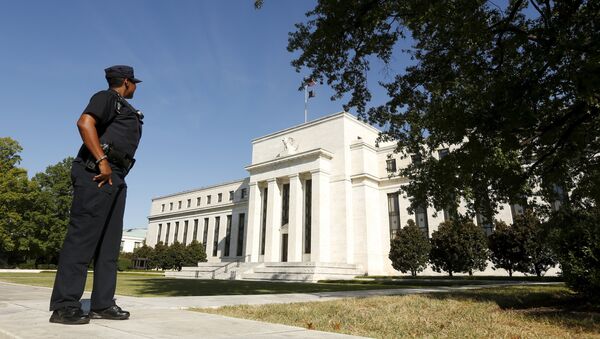US consumer spending added 0.4% in August, as reported by the Commerce Department on Monday after a similar increase in July in its final reading, revised upward. However, even though American businesses are selling larger amounts of goods and services domestically, the increased money flow hardly affected US inflation as imported goods and fuels are depreciating due to the dollar's strength and low US oil production breakeven, respectively.
Consequently, annualized inflation rose only 0.3% in August, far below the Fed's target of 2%. The impact of cheap fuels and imports is evident as price index excluding food and energy added an upbeat 1.3% in August. The US core price index has been holding steady at roughly 1.3% throughout 2015, and there are hardly any clues the measure would increase in the short-to-mid term.
Meanwhile, the US Fed chair Janet Yellen has repeatedly reiterated inflation would accelerate by the year's end towards the desired and rates hike-friendly 2%. So, while fundamentals suggest the opposite, Wall Street is losing confidence in Yellen's message. Consequently, all three US major stock indices have posted a five-day chain of losses, though mainly attributed to the upcoming earnings season, expected to provide yet another disappointment.
US consumer data is upbeat, nonetheless, suggesting a greater demand for goods and services and indicating the increased well-being of America's households. Most other macro data is encouraging: while Q2 GDP growth rose to an impressive 3.9%, the economy's strength leaves little doubt.
The economy is so far performing rather well amidst the global financial turbulence, providing stronger short-term headwinds to US finance. Wall Street's main concerns are low inflation and a strong dollar: the subsequent Fed's protraction over hiking the interest rate is stirring the threat of asset bubbles. Indeed, while Americans are spending more money at the most unchanged prices, stock market value of certain businesses is rising, further supported by the expensive dollar.
US salaries added 0.5% in August compared to 0.6% in July. Spending still outperformed incomes, with the personal savings rate adding only 4.6%, down from 4.7% a month earlier. Year-on-year consumer spending rose 2.9%, as estimated by the University of Michigan.
While consumer spending is easing concerns of a possible slowdown in the broader economy facing global headwinds, the economic activity in certain sectors is facing profitability limits. Vast stockpiles of raw materials have become a concern: the US need to put inventories into processing soon in order to both boost domestic manufacturing and spur petrol prices, thus providing an impulse to inflation.
Thus far, though, markets have little faith in Yellen's promises to boost inflation. Higher rates, resulting from inflation consistent with the 2% target, could also help depreciate the dollar thus helping profitability of US businesses' international operations. However, US 10-year breakeven rate for the oil industry slumped to just above $35/bbl as energy small caps have flooded the market, while US crude prices stand at $45.08/bbl. These figures suggest almost no support for inflation, while the Fed are not decisive enough to enact policy action to spur the prices index.



